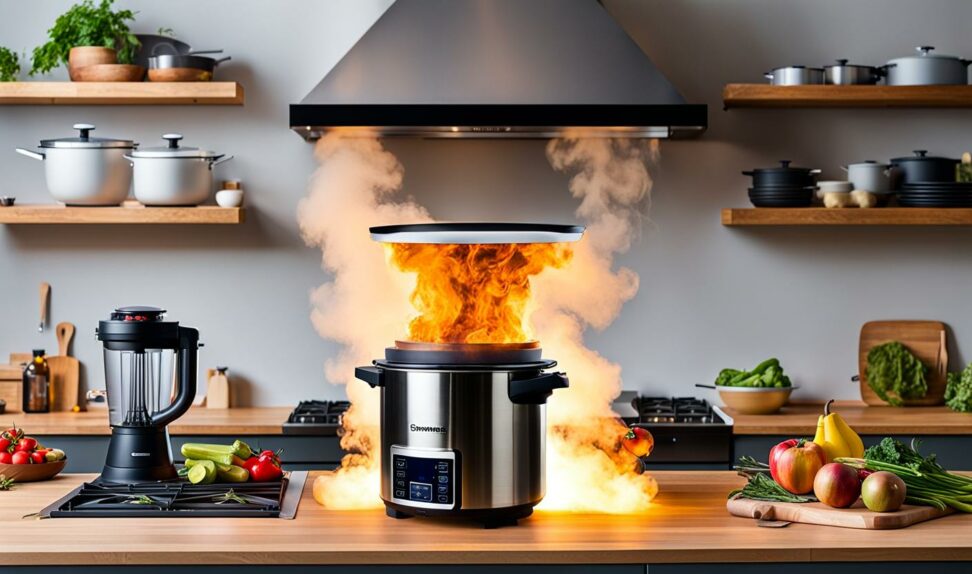The Ultimate Guide To Buying A Portable Kitchen Smoke Extractor
If your kitchen often fills with smoke and odors when cooking, it may be time to consider a portable kitchen smoke extractor. Unlike fixed range hoods, portable range hoods offer flexible smoke elimination that can be moved where needed or taken with you when relocating.
With key features like powerful fans, noise reduction, and ducting options, you can finally say goodbye to lingering cooking smells and enjoy fresher air.
How Portable Range Hoods Work
Portable kitchen extractors pull air through internal filters to trap cooking contaminants. Let's look at the main components and how they remove smoke, grease, and odors.
Smoke Extractor Fan
The extractor fan is the powerhouse that pulls air up and into the unit. High-powered centrifugal or axial fans create strong suction to capture cooking smoke and smells before they spread.

Filtration System
Extracted air passes through filters which catch and trap grease particles and odors. Mesh filters catch larger particles while charcoal filters use activated carbon to absorb smells and gasses.
Ducting
Filtered air needs to be vented outside, usually through ducting. Some models duct through walls or ceilings. Others use quick-connect ducts to vent through windows.
Key Features To Look For In A Portable Kitchen Extractor
Shopping for a portable range hood? Here are the most important specifications and features to evaluate.
Power and CFM Rating
CFM (cubic feet per minute) measures the airflow rate. The higher the CFM, the more cooking smoke the fan can effectively capture and remove. Consider these recommendations based on your cooktop's power:
- 30-150 CFM for a 1800W cooktop
- 200-400 CFM for a 2500-5000W cooktop
- 500+ CFM for commercial 6000W+ cooktops
Noise Levels
Hood noise is measured in decibels (dB). Look for models with ratings of 65dB or less for quieter operation during use.
Adjustable Chimney Height
Adjustable chimney extensions allow you to match the hood height to your cooktop size for optimal smoke capture. Ideal height is usually 18-32 inches above the cooking surface.
Stove Hood Width
Check that the filter opening matches or exceeds the width of your cooktop. Having adequate coverage prevents smoke from escaping around the edges.
Filter Types
Mesh filters catch larger particles while charcoal filters with activated carbon absorb odors and gasses. Charcoal filters need replacing every 3-6 months.
Timer and Auto Shutoff
Handy features allow the unit to run for a preset time or shut off automatically after detecting no activity below the hood.
Fire Suppression System
Some models have auto shutoff sensors to quickly cut power if flames are detected, preventing fire from spreading.
Lighting
Integrated LED lighting provides helpful illumination over the cooking surface.
Ducting Options
Look for ducting versatility like 7-inch to 10-inch chimney adapters and window venting kits to easily vent outside.
Benefits of Portable Kitchen Extractors
Compared to fixed range hoods, portable smoke extractors offer advantages like:
- Flexibility to use in different spaces as needed
- Easier installation without major ductwork modifications
- Can match any cooktop width
- Great for renters who can take it with them
Portable Range Hood Placement Tips
Proper placement is key for containing kitchen smoke. Follow these tips:
- Mount centered over the cooktop around 18-32 inches above
- Allow minimum of 6 inches clearance from walls
- Position near exterior venting access like windows or duct routes
Top Portable Smoke Extractor Recommendations
Based on expert tests and buyer reviews, we recommend these top portable kitchen extractors:
Best Overall: Tatsumaki TT-QR01
With powerful 600 CFM suction and low noise, the Tatsumaki TT-QR01 excels at removing smoke, grease, and odors. Dual fans provide 20% more power than single fan models. Fits up to 36-inch cooktops.
Runner Up: Brondell Circle Pure
The Brondell Circle Pure is a sleek, user-friendly option with 500 CFM of venting power. The activated carbon filter removes stubborn odors. Easy-click ducts attach right to your window.
Also Consider: Whirlpool WP7030EX
This budget-friendly Whirlpool model provides quality smoke elimination for smaller kitchens. The 400 CFM fan and dishwasher safe aluminum mesh filters make cleanup a breeze.
Honorable Mentions
Other recommended portable models include the ChefsIO Range Hood, XtremeAir Ultra Series, and Allanson Wall-Mount extractor. Compare noise levels, speeds, and size match for your needs.
FAQs About Portable Kitchen Extractors
How do I clean and maintain a portable range hood?
Regularly wash reusable mesh filters with soap and water or in the dishwasher. Replace charcoal filters every 3-6 months. Wipe down the fan blades and interior with a damp cloth to keep grease from building up.
How difficult is it to install a portable extractor?
Portable range hoods are much easier to install than fixed hoods. Most include mounting brackets and hardware for attaching to the wall or cabinet bottom. Ductless models are simplest with no venting needed.
How much do portable kitchen hoods cost to operate?
Operating costs are minimal, similar to running a bathroom vent fan. Higher CFM models use slightly more electricity. Turn off the unit when not in use to conserve energy.
Why is my portable hood not collecting all the smoke?
Make sure the unit is centered over the cooktop and the chimney height properly matches your stove. Check the CFM rating meets your cooktop heat output. Filters may need cleaning or replacing.
Adding a portable kitchen smoke extractor is one of the best ways to keep your cooking area fresh and smoke-free. Keep this guide in mind when shopping for the perfect model to match your cooktop, kitchen size, and venting requirements. With powerful but quiet operation, high-quality filtration, and flexible ducting, you’ll be breathing easy in no time.